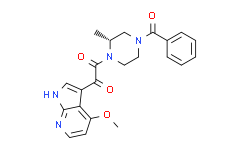In a series of biochemical assays, BMS-378806 is not an effective inhibitor of HIV integrase, protease, or reverse transcriptase, but did compete with soluble CD4 binding to a monomeric form of gp120 in an ELISA assay with IC50=100 nM. The specificity of BMS-378806 toward inhibition of HIV-1 is confirmed by evaluation against HIV-2, SIV, MuLV, RSV, HCMV, BVDV, VSV, and influenza virus, with no significant inhibitory activity observed at concentrations ranging from 10 to 30 μM and no overt cytotoxicity toward the host cells, CC50>225 μM. BMS-378806 is not a potent inhibitor of any of the five major human CYP isoforms, evaluated as recombinant preparations, with IC50 values of >100 μM for CYP1A2 and CYP2C9, 23 μM for CYP2C19, 20 μM for CYP2D6, and 39 to 81 μM for CYP3A4. Moreover, since BMS-378806 is metabolized by CYP450 1A2, 2D6, and 3A4, it is unlikely to lead to severe drug?drug interactions in a clinical setting. BMS-378806 inhibits viral replication by interfering with the binding interactions of gp120 with the cellular CD4 receptor. The IC50s determined for the gp120s from HIV LAI, BAL, NA420LN40, SF162, NL4-3, NA420B33, YU2, AD8, JRCSF, and 92US15.6 are 0.1, 0.1, 0.3, 0.5, 0.6, 0.7, 0.9, 1.0, 1.1, and 1.6 μM, respectively. A similar observation is also made for BMS-378806 (IC50s range from 0.2 to 9.6 μM). BMS-378806 binds directly to gp120 at a stoichiometry of approximately 1:1, with a binding affinity similar to that of soluble CD4. The potential BMS-378806 target site is localized to a specific region within the CD4 binding pocket of gp120 by using HIV-1 gp120 variants carrying either compound-selected resistant substitutions or gp120-CD4 contact site mutations.
Medlife has not independently confirmed the accuracy of these methods. They are for reference only.



 扫码关注公众号
扫码关注公众号